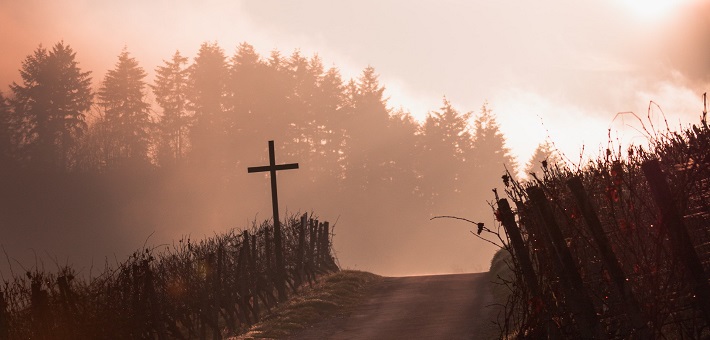Commentary on Proverbs 1:20-33
The book of Proverbs features two loud women. Both of them stand in public places, making noise. Both of them are articulate and shrewd as they persuade and seduce passersby. Both of them are disruptive. Of course, these are not real women. They are personifications: “the strange woman” (5:3–14; 7:10–27; 9:13–18) and “woman wisdom” (1:20–33; 4:5–9; 8:1–11, 12–36; 9:1–6).
Because the book of Proverbs has a largely pedagogical setting, written by men, for young men, its rhetoric is aimed at formation. Repeatedly, the texts indicate their audience: “Hear, my child, your father’s instruction, and do not reject your mother’s teaching” (1:8). “My child” is literally “my son” in Hebrew. These two women fit into the book’s overarching program of forming young men on the right path and not the wrong one (for example, 2:1–15; 4:10–27). These two personifications function as moral emblems of vice and foolishness, on the one hand, and virtue and wisdom, on the other.
Please be careful in your preaching not to perpetuate sexist stereotypes about women as either “pure” or “impure,” “virtuous” or “loose,” “wise” or “foolish.” The texts, with their ancient male audience in mind and their binary worldview, oversimplify for the sake of memorable clarity—a strategy often used in teaching children but not appropriate from the pulpit. One of the functions of the figures of these two women is to justify and valorize ancient patriarchal social arrangements.[1] We have no need to perpetuate them, and frank acknowledgement of this dimension could be beneficial for your audience. But there are other recoverable dimensions for preaching. Here are a few ideas:
- Wisdom is a woman speaking in public
Proverbs 1 is the first of Woman Wisdom’s several long speeches. Women’s voices have often been actively denied or suppressed. But here, wisdom comes from a woman who is a teacher, preacher, participating with God, and perhaps herself divine (8:22–31). Wisdom speaks in public:
Wisdom cries out in the street;
in the squares she raises her voice.
At the busiest corner she cries out;
at the entrance of the city gates she speaks (Proverbs 1:20).
This could provide an opportunity to consider and celebrate how women’s voices have contributed to the wisdom and edification of your community. You could extend it beyond women to consider where historically marginalized voices still need to be sought out in your community. Perhaps you could publicly repent for specific moments in your community’s life when such voices have gone unheeded. Certainly, this text acknowledges that the refusal to listen to such wise voices can lead to harm. This would also be an appropriate time to examine the public roles of women and members of marginalized groups in liturgy and leadership.
- Wisdom is the foundation of creation
There is a close link between wisdom and creation. Take, for example, Proverbs 3:19–20:
The Lord by his wisdom founded the earth
by understanding he established the heavens
by his knowledge the deeps broke open,
and the clouds drop down the dew.
It is through wisdom that the patterns of the natural world are founded and sustained. In Proverbs 8:22–31, the poet takes time to draw out a somewhat detailed evocation of wisdom at the creation of the world, including these lines:
When he established the heavens, I was there,
when he drew a circle on the face of the deep… (verse 27).
The formation of the waters, the heavens, the mountains, and humans are all linked to the creator, who is delighted by wisdom, by the world, and by humans in particular (8:30–31).
In this broadened context, wisdom and insight are not merely individual acquisitions that can be used in service to personal piety, successes, wealth, and a hedge against disaster. Instead, to seek wisdom is to willingly choose to find one’s way and grounding as a creature among creatures in a creation sustained by God. It is to be infused with the “thoughts” and “words” that permeate the world with divine breath (1:23). To do so is to be “secure” and to “live at ease” (1:33). This is to participate in the pattern of the natural world, making choices to benefit the whole, not merely securing one’s own advantages.
- Ignoring wisdom has vast, ecological implications
The greater part of Proverbs 1 focuses on the consequences of ignoring wisdom. This is part of a pragmatic worldview that understands the links between cause and effect. A parallel might be drawn to the global ecological crisis. The proportions are vast, and we are indeed being struck with “storm” and “whirlwind” (verse 27), with more natural consequences to follow if we do not act. How long will we continue to ignore wisdom? How long will we refuse to listen to indigenous voices protesting new pipelines? How long will we shut down, ignore, or obscure the findings of environmental scientists? How long will we “hate knowledge” and “ignore counsel” and refuse to accept reproof for our anthropocentric solipsism? How long will we ignore wisdom, as we ignore the voices of the prophets? To listen is to fear God (verse 29).
Notes
- Carol A. Newsom, “Woman and the Discourse of Patriarchal Wisdom,” Reading Bibles, Writing Bodies, eds. Timothy K. Beal and David Gunn (London: Routledge, 1996). For a contemporary discussion of the functions of sexism and misogyny, see Kate Manne, Down Girl: The Logic of Misogyny (New York: Oxford University Press, 2018).


September 12, 2021